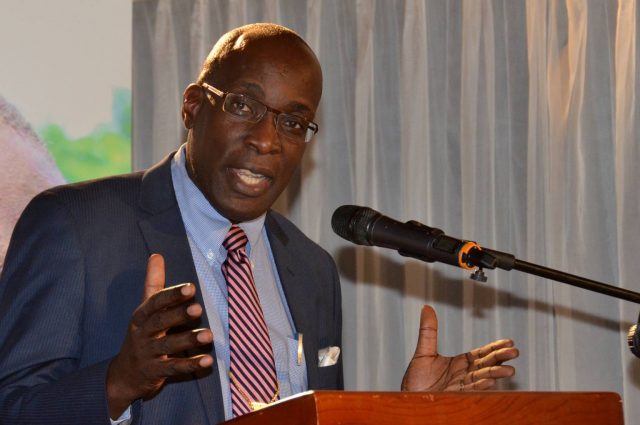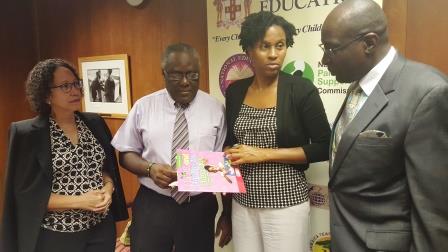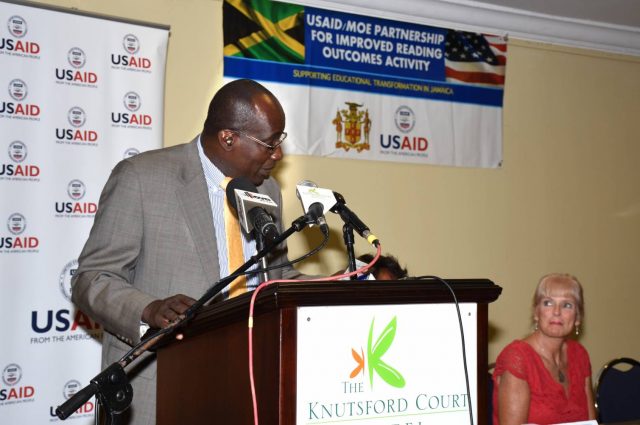Minister of Education, Youth and Information Ruel Reid (centre) participates in the signing of a memorandum of understanding between the Jamaica-based Caribbean Maritime Institute (CMI) and GAT Cluster Caribes in Martinique last week. CMI is to provide regional capacity building services. Other participants from left are Dr. Ibrahim Ajagunna, Director of the School of Academics, CMI; Ms Sandra Casanova, President GAT Cluster Caribes; Dr Fritz Pinnock, Executive Director, CMI and Mr Balfour Peart, CEO Tycarbal Associates, USA. The signing took place during the First Caribbean Transport and Logistics Trade Fair (SCTL) held in Martinique on May 11 to 13, 2016.
Category: Uncategorized
Governor General: Scholarship Announcement
JIS: Applications are invited for theSir Patrick & Lady Allen 40th Anniversary Scholarshipfor study at the University of Technology leading to a Bachelor of Science in either of the following fields: Medical Technology, Applied Science or Mathematics and Education.
The scholarship covers tuition and ancillary fees for the selected degree programme which should begin in the 2016/2017 academic year.
Applicants should either be successful first year university students or secondary school students who exceed UTECH’s minimum requirement for acceptance in the selected programmes. Priority consideration will be given to bright, financially challenged students.
Applications should be submitted to The Office of The Governor-General, King’s House, Kingston 6, on the prescribed form, no later than June 20, 2016 via email[email protected].
The winner will be required to render at least three weeks of voluntary service each year and on successful completion of the degree programme, will be bonded to work in Jamaica for four years.
Application Form for the Sir Patrick & Lady Allen 40th Anniversary Scholarship
CAPTION:
Photo: FILE
Governor-General, His Excellency the Most Hon. Sir Patrick Allen.
Education Ministry Honours Former Employees
Seven former educators and administrative staff members were honoured during an intimate, mid-afternoon appreciation function held on Monday, May 9, 2016 at the Jamaica Pegasus Hotel. The distinguished honorees were Patricia Bryan Britton, Hilary Dawn Foster, Sharon Neil, Amina Blackwood Meeks, Yvonne Clarke Campbell, Sonia Mullings, and Icema Reid.
These former employees were applauded for the sterling contribution and unwavering service over the last four decades to the education sector and in various capacities within the Ministry of Education, Youth and Information, ranging from Regional Director to Administrative Assistant.
Dr. Maurice Smith, Permanent Secretary, showered accolades on the former employees and thanked them profusely for their invaluable contribution to the education sector and in particular, the children of Jamaica.
Dr. Grace McLean, Chief Education Officer concurred with Dr. Smith and added that she was pleased to have had the opportunity to work alongside all the retirees and assured them that their input and support over the years have been priceless.
The retirees were provided with framed citations, highlighting their work achievements throughout the years, and several other tokens of appreciation.
Ruel Reid: Our Youth Still Need CAP
The Gleaner: IN A RECENT ARTICLE, ‘The CAP doesn’t fit’, published in the In Focus section last Sunday, co-authors Franklin Johnston and Radley Reid appeared oblivious to the fact that 5,000 students currently benefit from the additional two years of secondary schooling under the Career Advancement Programme (CAP).
These students are seizing the opportunity to gain the necessary competencies and skills so they can move on to the world of work or to higher studies. The NVQ-J skills certification rate among CAP participants moved from 37 per cent in 2013 to 54 per cent in 2015.
Johnston and Reid argued that resources should, preferably, be spent on improving education outcomes at the early childhood, primary and secondary levels, including the provision of equipment and laboratory facilities. While the Ministry of Education, Youth and Information acknowledges that this is the ideal situation, the reality is that, annually, some 20,000 students exit the secondary-school system at grade 11 without adequate certification to gain employment or pursue further studies.
While this demographic may include students who were not effectively instructed during their earlier period of schooling, others are late bloomers or have special-learning needs that require them to be exposed to six or seven years of schooling up to age 18.
So, yes, the ministry will seek to reduce the number of underachieving students by providing the necessary resources, including the allocation of more than $243 million to upgrade equipment during this financial year. Furthermore, it is anticipated that the phased implementation of the New Standards Curriculum and the Alternative Pathways to Secondary Education approach this September will reduce, over time, the number of students who require mediation.
However, we underscore the point that there will always be students, based on the pace of their development, who will need an extended period of schooling at the secondary level. This is a policy emphasis of the new administration in accordance with best practices in other jurisdictions.
ADEQUATE SPACE AND RESOURCES
Johnston and Reid questioned if the ministry would find the space and adequate resources to properly deliver the programme during grades 12 and 13. The answer is yes. A total of $850 million has been allotted to CAP for the new financial year, and we will find space.
We currently have 53 institutions that are running CAP successfully. Since my announcement of the additional two years of secondary schooling, the ministry has received more than 60 additional expressions of interest. Other institutions are calling to be a part of the programme.
We should note that the enrolment at secondary level is declining and, therefore, more than 40 of these schools are operating with smaller numbers than what they had three years ago, thereby providing space for utilisation in implementing the expanded CAP. In addition, the combination of the youth and education portfolios provides additional facilities for education and training.
This means there is no need to be “forcing the shift system with all its weaknesses and failures on the already weak students,” as Johnston and Reid fear. In fact, the programme to remove schools off shift continues with six high schools and several all-age and junior high schools slated to be taken off during this financial year.
Johnston and Reid asked: “What will participants learn during the two additional years? Is it repeating, remaining static, or advancing to prosperity?”
The CAP is designed with the following features that will allow students to progress:
• Building skills through education:
• Continuing education: through grades 12 and 13.
• Apprenticeship Programme.
• Customised education and training relevant to career choices.
• Elective training in technical vocational specialisations.
• Personal development: training in life-coping skills and personal development.
• Career development: orientation to careers and selective career counselling.
• National service/corps.
It is a testament to the maturity of the political system that three different administrations have sought to incrementally improve a particular programme. Following its introduction in 2010, the Career Advancement Programme showed deficiencies. The programme was significantly improved by the succeeding administration, and now a third administration is taking it to another level. The new policy shift involves the mainstreaming of CAP as the premier TVET programme of study for the 16-18 age cohort. The ministry will be targeting more than 10,000 participants for the 2016-2017 academic year, almost doubling the number of participants during each of the last two years.
Our youth still need a CAP.
• Senator Ruel Reid is the minister of education, youth and information.
Education Minister Discusses Sexuality Education With Advocacy Group
SENATOR RUEL Reid, Minister of Education, Youth and Information met today with representatives of the Jamaica Coalition for a Healthy Society (JCHS) to hear their concerns about the infiltration of Comprehensive Sexuality Education philosophy into the education system.
Minister Reid made it clear that the Education Ministry’s philosophical position is that gender is fixed as male and female. He said a recent review of the approved books used with the Health and Family Life Education curriculum indicate that their contents are in conformity with Jamaica’s philosophical position on sexuality and gender.
The current Health and Family Life Education (HFLE) curriculum on sexuality education was reviewed in 2012, following claims that it violated Jamaican norms and values. Minister Reid disclosed that the Ministry’s three-year curriculum cycle now requires a review of the HFLE material.
In conducting the review, Minister Reid indicated that the Ministry would take into consideration the concerns raised by local advocacy groups to ensure that the curriculum reflects Jamaica’s values and philosophical perspectives.
In addition, the Education Minster said he would ask Cabinet to pronounce on Jamaica’s position on sexuality education in order to provide
MOEYI Launches Our-Children-JA Campaign
The Ministry of Education, Youth and Information has launched a national public education campaign aimed at solidifying in the minds of the general public that every Jamaican child is our collective responsibility and must be treated as a national asset.
The campaign, entitled ‘OUR CHILDREN JA’, was launched recently by Floyd Green, State Minister in the Ministry of Education, Youth and Information during a national broadcast at the start of Child Month which is being celebrated under the theme, “Healthy Children Build a Stronger Nation”.
In announcing the start of the campaign Minister Green disclosed that in 2014, the Office of the Children’s Registry received 8450 reports of sexual, emotional and physical abuse combined with 5818 cases of neglect. This was a 10-per cent increase from the preceding year.
Noting that there were still a high percentage of unreported cases, Green Minister said the “prevailing culture of silence must be broken” and that the society must begin to fundamentally look at evolving the culture of caring for our children.
It is against this background that the Ministry is implementing the ‘OUR CHILDREN JA’
public awareness campaign. Through this campaign Minister Green will seek to invigorate and energise the message of Child Month and to publicise child-related activities during this month and beyond. He will host a Twitter Town Hall forum and chat on May 19.
The campaign will run initially for three years and includes the sustained use of outdoor advertising and mainstream media to keep the message at the fore front of public consciousness, as well as the creation of an annual song by a recording artiste. In addition, media and entertainment personalities will be utilised to voice support for the campaign.
“We want to provide all Jamaicans, with knowledge on the best practices and principles of taking a holistic approach, to the raising and wellbeing of our children,” Minister Green noted.
He said with this campaign, the Ministry intends to usher in a new era of public-private sector collaboration and broadly spread messages that can improve citizens knowledge about the education, health, protection and parenting of children, while encouraging that “it takes a village” to raise a child.
Teachers’ Day 2016 Message
Teachers’ Day 2016 Message By
Senator, Hon Ruel Reid Minister of Education, Youth and Information
The Ministry of Education, Youth and Information pays tribute to all the teachers of Jamaica on their special day.
Many teachers have gone the extra mile to ensure that their students are mentally and socially equipped to be productive and useful citizens of Jamaica and the world.
On this Teacher’s Day I am signalling a new policy thrust by the Ministry that emphasises the preparation of children for learning before they enter the formal education system and come under the tutelage of teachers.
The Education Ministry recognises the need for infants to be properly fed and stimulated. In this regard, we propose to partner with the Ministry of Health as well as the Ministry of Labour and Social Security to reintroduce the early stimulation programme that supports vulnerable mothers and infants prior to age four.
In addition, the National Parenting Support Commission has been asked to intensify its outreach programmes to parents in order to equip them with the knowledge and resources to assist the education of their children.
Another policy thrust of the Ministry is to accurately identify the level of special needs among the student population and effectively treat with this. The planned introduction of the Alternative Pathways to Secondary Education approach is one means of addressing different learning needs.
Altogether these initiatives are all aimed at minimising obstacles in the teaching and learning process, thereby making the teacher’s job less challenging. We are paving the way to significantly improve education outcomes. This is the goal of my administration.
Happy Teachers’ Day.
Church Urged to Help Counsel Abused Children
JIS: The church is being called on to help in the counselling of abused children, and to assist the authorities in nabbing perpetrators.
Minister of State in the Ministry of Education, Youth and Information, Hon. Floyd Green, says the church has the capacity to play a greater role in the security of children.
“We have a collective responsibility to ensure that each child is taken care of, that each child is protected, and I hope the church will join with us,” the Minister of State told the congregation gathered for the Child Month National Church Service, at the Emmanuel Apostolic Church, in Portmore, St. Catherine, on May 1.
Arguing that every child is “our national asset,” Mr. Green told his audience that a redoubling of effort is required to protect the children. “If you know a child is being abused, speak up. Break the culture of silence,” he urged.
The Minister of State said he wants more persons to look out for signs of detachment in children; to provide guidance where they can, and where they know or hear of abuse, supply the Office of the Children’s Registry (OCR) with the information.
He said all persons of goodwill must become “informers” if that is what it will take to provide security for children against abusers.
“If you hear, let us do the investigation. We have the entities that will intervene, and under the Child Care Protection Act, it is a crime if you know about child abuse and you don’t report it,” Mr. Green reminded.
The Minister of State said that under a new programme, called ‘Our Children JA’, there will be increased focus on helping parents to provide children with healthy foods; strengthening the diagnostic systems for children with special needs; and improving the reporting and investigative arms of the OCR.
CAPTION:
Photo: Mark Bell
State Minister in the Ministry of Education, Youth and Information, Hon. Floyd Green (right), is greeted by Chief Executive Officer of the Child Development Agency (CDA), Rosalee Gage-Grey, at the Child Month National Church Service, held at the Emmanuel Apostolic Church, in Portmore, St. Catherine, on May 1.
Reading Programme Lauded
JIS: Several teachers and education officials are lauding the Education Partnership for Improved Reading Outcomes, for equipping the education system with the tools for steady progress in literacy.
Under the three-year project, which ended in March, the Education Ministry, in collaboration with the United States Agency for International Development (USAID), provided capacity building and technical assistance to the National Literacy Programme, implemented in 2010, through a comprehensive reading programme in 450 schools.
It provided ninety Reading Coaches in all 450 schools in the first year; and provided support in literacy strategies to teachers at Grades 1-3, enabling them to more effectively support the students in the system, reaching over 100,000 students.
“It is an awesome programme. Not only did Grades 1-3 benefit, but also Grade 4,” says Principal of the St. Andrew based Cockburn Gardens Primary and Junior High School, Patricia Findlay, in an interview with JIS News.
She adds that her school was able to employ a Reading Coach who received a top award for outstanding work on the project, while another teacher at the institution was able to get valuable experience from it. “I expect our grades to go up, and we will do better in the future,” she says.
Teacher at Port Henderson Primary School, in St. Catherine, Andréa Bryan, says the experience was insightful. “I learnt many strategies to help our children, and also to work with other teachers,” she tells JIS News.
For Kimberly McKenzie Morris, who worked as a Reading Coach on the project, it was fulfilling. “Teachers gained a lot from the experience. The techniques that we have shared are still being maintained, and that is very rewarding,” she says.
Reading Advisor on the project, Dr. Maureen Byfield, who represented Project Director, Claudette Carter, at the recent closing out ceremony for the project, says “special attention” was given to gender sensitive instructions, “as it is important to understand issues related to instruction for boys and girls.”
“To this end, a Gender Specialist developed a gender manual, which is of tremendous value to the system,” she adds.
Dr. Byfield notes that Grade 3 children who benefited from the various interventions were among those who “surpassed expectations in the recent Grade 4 Literacy Test.”
“We look forward to teachers and principals continuing to use the various strategies to which they have been introduced, so that the benefits will be sustained,” she tells JIS News.
A Parenting Specialist was engaged to spearhead the establishment of Parents’ Places in several schools across the island.
“The Specialist worked with the team to promote good parenting strategies; to educate parents in ways to support their children’s literacy development; and also imparted ways to support the schools where their children attend,” Dr. Byfield notes.
Principal of the Schoolfield Primary School, in St. Elizabeth, Prim Lewis, says it was a successful venture.
“I was a beneficiary of the project, and the Jamaican students are the winners. We promise to use the materials effectively to sustain the programme,” she tells JIS News.
To complete the printing of Literacy 123 material for Grade 3, conduct final audit assessment, compensate employees, and pay for goods and services under the project, the Government has set aside more than $53 million in the 2016/2017 Estimates of Expenditure, now before the House of Representatives.
For his part, Minister of Education, Youth and Information, Senator the Hon. Ruel Reid, says he is delighted that the partnership had included “very critical components,” including the establishment of parents’ places, and the development of special manuals relating to gender, parenting and lesson planning.
“Studies have shown that where parents have access to the school compound and are integrally involved in the education and development of their children, the learning process is enhanced,” the Minister says.
Mr. Reid says he is pleased that a great deal of time and resources were spent in the hosting of workshops, to develop the gender manual to guide stakeholders.
“The student-parent-school bond is one which works and the positive results are there to show it,” he notes, adding that teachers, coaches and principals who worked and embraced the project must be commended.
“This is an initiative which we must continue, and find ways to make our system more conducive to learning and development. I urge the school leaders and teachers to ensure that these gender manuals are utilised to their fullest effect. This hard work by the project team must not be in vain,” the Minister emphasises.
“Our children deserve only the best and everything must be done to cater for the efficient instruction of our boys and girls at the early grade level of the system,” he adds.
Mission Director with USAID, Denise Herbol, highlights that the Parents’ Places which offer avenues at the educational institutions for educators and parents to engage in promoting reading for children, are part of the most critical components of the project.
Deputy Chief Education Officer, Dorset Campbell, says the project provided rich resources in learning materials for the students.
“The coaching support was excellent, and some elements of the programme have been incorporated into the new curriculum,” she informs.
CAPTION:
Photo: Mark Bell
Minister of Education, Youth and Information, Senator the Hon. Ruel Reid (at podium), addresses the recent closing ceremony for the Education Partnership for Improved Reading Outcomes project, held at the Knutsford Court Hotel, in New Kingston. At right is Mission Director with the United States Agency for International Development (USAID), Denise Herbol.
OCR Invites Students to Become Child Ambassadors
JIS: The Office of Children’s Registry (OCR) is inviting primary and high school students to apply to become child ambassadors for the period 2016 to 2018.
Applications must be submitted by May 15, 2016 and students must be between 10 and 16 years of year years, in order to apply for the two-year programme.
Speaking at a JIS ‘Think Tank’ on April 27, Registrar at the OCR, Greig Smith, said the agency is inviting applications from all parishes, except St. Mary and St. James, as the last two child ambassadors came from those parishes.
He noted that the students will sit an interview, following which the successful candidates will be selected.
“Each ambassador will be formally appointed by the Minister of State in the Ministry of Education, Youth and Information, Hon. Floyd Green, before they take up the two-year post, which ends in 2018,” Mr. Smith explained.
The Registrar noted that the child ambassador programme has been helping the ORC with the ‘Break the Silence’ and ‘Enough is Enough’ campaigns.
“Having a child ambassador will give youngsters the confidence to talk to their peers and open up, since many abuse takes place at home or by a relative,” he said.
Mr. Smith pointed out that statistics show that only one in every 10 adult Jamaicans report child abuse, but there has been an increase in children making reports, especially to their respective child ambassadors.
He said appointed students will be asked to assist with the OCR’s public education activities, such as the creation of flyers and public service announcements as well as educating their peers about what they can do to protect themselves and what they need to do if they suspect or know of cases of child abuse.
“The ambassadors will also form school clubs to deliver the OCR messages from one child to another and participate in decision making and other public education initiatives,” he added.
The Child Ambassador Programme, which was launched by the OCR in 2012, aims to get more children involved in the fight against child abuse, as well as increase their awareness of the agency’s role and functions.
Interested persons can download application forms from the OCR’s website at www.ocr.gov.jm, or they can visit the agency’s headquarters at 12 Carlton Crescent, Kingston 10, or any of its parish offices. The completed forms should be returned to the agency’s head office or parish offices.
CAPTION:
Photo: Mark Bell
Registrar at the Office of the Children’s Registry (OCR), Greig Smith, speaks at a JIS ‘Think Tank’, on April 27. Listening (from second left) are: Minister of State in the Ministry of Education, Youth and Information, Hon. Floyd Green and Chief Executive Officer (CEO) at the Child Development Agency (CDA), Rosalee Gage-Grey.










